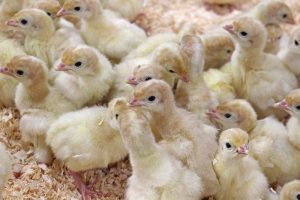ISU turkey research facility now up and running
November 21st, 2022 by Ric Hanson
(Radio Iowa) – As we approach Thanksgiving a turkey teaching and research facility that is the first of its kind in the U-S is now operating on the Iowa State University campus. Dawn Koltes in the I-S-U Animal Science Department says it is a joint project with the industry to improve how they operate. “What’s really cool about this building is it came from a need from the producers to understand some basic questions that they had in terms of management practices, even including some of the feed and feed additives that are on the market,” Koltes says. She says producers won’t have to use their own flocks to test various practices, while I-SU does the testing. There’s another benefit of having a turkey lab to show off the process.
“The other thing that is really much a need, as in most of our animals sectors, or even ag sectors, more generally here is the need to increase understanding about where food comes from, as well as finding kind of labor stream or labor pool for that next generation,” she says. Koltes says they’ll do that by encouraging the public and groups to visit and see how things work. “Because we have viewing windows in what’s called our vestibule area, and it’s a public space. So people can come in and right now even go in and see the poults as they are in their environment,” Koltes says. “We have a lovely mural on the wall that Greta Irwin at Iowa Turkey Federation and Morgan Pothoven, also with Iowa Turkey Federation, helped put together to explain what the turkey industry is and what it means to the state of Iowa.” She says they have some things set up to let visitors understand the growing process.
“What should we see, when we start looking at these birds? What should we hear when we listen to these birds and what should we be looking for? And so we have kind of those questions so that a stand by the window, you can ask those of yourself,” she says. “And then not only do we have it from the outside, but we also have it on our grower finisher side, which is where those birds after they reach about five or six weeks of age will be moved to.” The research will cover a variety of issues that are facing the industry. “Microbes and diseases that we know a there cause harm to our birds — or even on the human side. So, salmonella would be one that the birds can host, but then don’t necessarily have an immune response to but unfortunately, we do,” Koltes says. They will also look at new technologies such as air handlers, and other things that can impact the health of the turkeys.
“How do we maximize our water vaccination strategies? How do we provide supplements in the feed or the water? So for instance, during bouts of heat stress, people can put electrolytes in,” Koltes says. “So just like when we get hot and sweaty, and you know, we’ve been working out we go have a Gatorade or some other fluid that has electrolytes in it. We’re trying the same types of things to ask, does it really help with the turkey production? So is it worth spending the money to put that into the water lines?” The are classrooms where animal science students can work and study some of these issues. The facility is called the Balloun Turkey Teaching and Research Facility after the main donor, Julia Balloun. It was dedicated in May 2022 and the first set of turkey poults were recently delivered.






